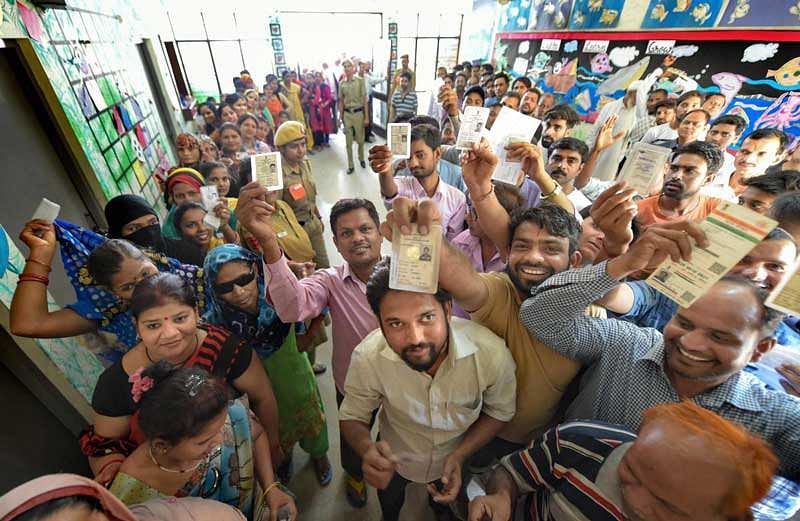
Delhi is set to vote once again after a series of turbulent government changes in 2013 and 2015, the latter of which saw the rise of Aam Aadmi Party in the union territory and the first stable government the region saw in nearly a decade.
But before Delhi goes out to ink its fingers, let's look into how political parties fared in 2008, 2013 and 2015.
2008
According to the Election Commission of India, there were 1.07,26,573 voters registered in 2008, of which 61,76,075 voters actually cast their franchises, amount to 57.58% polling. The total number of valid votes was 61,77,344.
Among the parties who contested, BJP and Congress took the lion's share of the votes, with BJP getting 22,44,629 votes or 36.34 per cent of the votes and the Congress got 25,89,816 votes or 40.31 per cent of the votes. The BSP came far in the third with 8,67,672 votes or a mere 14.05 per cent of the votes, with the other parties and independents taking minute chunks of the remaining votes.
2013
2013 had one major change over 2008: Aam Aadmi Party, born from the remnants of the Jan Lokpal hartal, took to the political scene with the aim of taking Delhi's throne. Led by Arvind Kejriwal, AAP led a strong campaign, leaving a strong mark on the electoral share in the elections. This, coupled with the Sheila Dikshit government losing credibility in the wake of the Nirbhaya rape case, led to the Congress' collapse and AAP's rise in the region.
According to the Election Commission of India, there were 1,19,63,630 voters registered in 2013, of which 78,33,919 voters actually cast their franchises, amounting to 65.63 per cent polling. The total number of valid votes was 78,23,820.
Among the parties who contested, newcomer AAP made a strong impression eating into the BJP and Congress' votes with 23,22,330 votes or 29.49 per cent vote share. BJP got 26,04,100 votes or 33.07 per cent vote share and Congress got 19,32,933 votes or 24.55 per cent of the vote share. BSP, which had shown a reasonable performance in 2008, was reduced to a mere shadow, with just 4,20,926 votes or a paltry 5.35 per cent of the votes. The remaining parties and independents took small bits of the remaining votes.
2015
2015 is when Delhi saw its second stable government since 2008. Kejriwal, who had taken the reins in 2013, had resigned in just two weeks, citing his inability to implement Jan Lokpal. Delhi had succumbed to chaos, with President's Rule implemented through 2014, after which LG Najeeb Jung recommended dissolving the Assembly and conducting fresh elections.
According to the Election Commission of India, there were 1,33,13,295 voters registered in 2015, of which 89,36,159 voters actually cast their franchises, amounting to 67.12 per cent polling. The total number of valid votes was 89,42,372.
Aam Aadmi Party, despite the fiasco of 2013, made an even stronger impression in 2015, scoring over 48,78,397 votes or 54.34 per cent vote share. BJP and Congress' vote shares continued their downward trend, with the BJP getting 28,90,485 votes or 32.19 per cent vote share and the Congress got a mere 8,66,814 votes or 9.65 per cent of the votes. All the other parties took what little votes there were left, and Aam Aadmi Party once again formed a government in the UT, which has lasted five years.